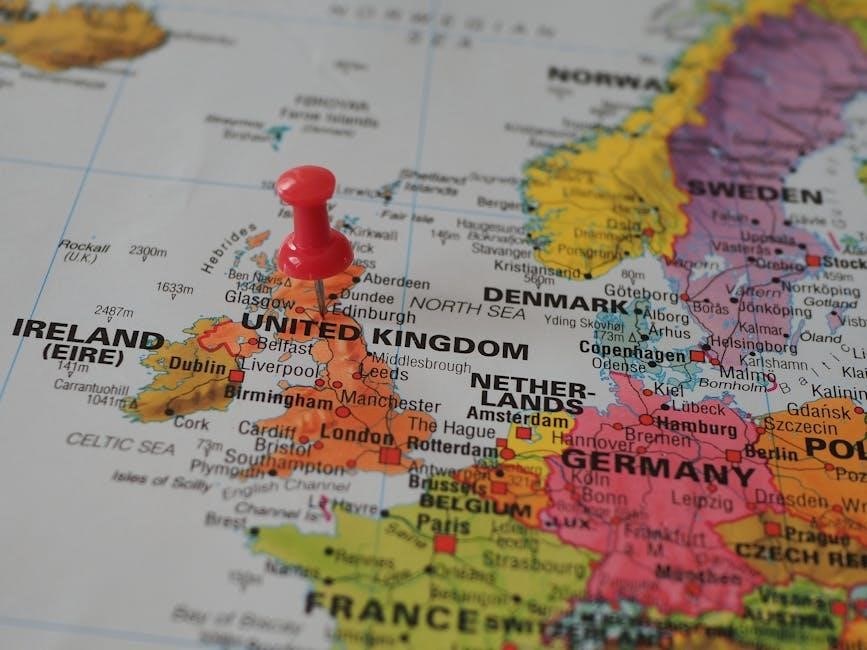
unit 6 consequences of industrialization study guide
Industrialization transformed societies by shifting economies from agrarian to factory-based systems‚ sparking technological advancements and global trade expansion between 1750 and 1900. This period reshaped social structures‚ labor practices‚ and political power dynamics worldwide.
Definition of Industrialization
Industrialization refers to the widespread shift from agrarian economies to those dominated by industry and manufacturing. It involves the development and use of machines‚ factories‚ and fossil fuels to produce goods on a large scale. This process transformed societies by replacing manual production with mechanized systems‚ fostering economic growth‚ and altering social dynamics. Industrialization is characterized by technological innovation‚ increased productivity‚ and the emergence of new industries‚ which collectively reshaped global trade and labor systems. It also led to significant environmental and social changes‚ including urbanization and the rise of a industrial working class. The period between 1750 and 1900 marked the height of industrialization‚ particularly in regions like Britain‚ Europe‚ and North America‚ where it laid the foundation for modern capitalism and global economic structures. Understanding industrialization is key to analyzing its far-reaching consequences on societies worldwide.
Timeline of Industrialization (1750-1900)
The industrialization process began around 1750‚ marked by the invention of the steam engine and the development of textile machinery‚ which revolutionized production. By the late 18th century‚ Britain emerged as the epicenter of industrialization‚ with factories replacing cottage industries. The 19th century saw the expansion of railroads‚ starting in the 1820s‚ which facilitated the transportation of goods and people‚ further accelerating industrial growth. The 1830s and 1840s witnessed the rise of heavy industries like steel and coal‚ while the telegraph enabled faster communication‚ integrating global markets. By the 1850s‚ industrialization spread to other regions‚ including the United States and Germany‚ which became major industrial powers. The late 19th century saw the introduction of electricity and the assembly line‚ leading to mass production. By 1900‚ industrialization had transformed economies worldwide‚ creating new technologies‚ industries‚ and social systems. This period laid the foundation for modern industrial society‚ with its advancements and challenges shaping the world for centuries to come.
Key Regions Affected by Industrialization
Industrialization primarily impacted regions with abundant resources and strategic advantages. Britain‚ often called the “workshop of the world‚” was the first to industrialize‚ with its coal and iron reserves driving mechanized production. Western Europe‚ particularly Belgium‚ France‚ and Germany‚ followed‚ leveraging their industrial bases and colonial resources. North America‚ especially the United States‚ experienced rapid industrialization‚ fueled by vast natural resources and innovative technologies. Eastern Europe and Russia industrialized later‚ with Russia focusing on heavy industry and railways. Additionally‚ Japan underwent rapid industrialization in the late 19th century‚ adopting Western technologies to modernize its economy. These regions became hubs of industrial activity‚ shaping global trade and economic power dynamics. Each region’s industrialization pace and focus varied‚ but all contributed significantly to the global transformation of economies and societies during this period.

Social Consequences of Industrialization
Industrialization caused significant social changes‚ including rapid urbanization‚ overcrowded living conditions‚ and shifts in labor dynamics. It also exacerbated social inequalities‚ reshaping class structures and influencing societal dynamics globally.
Urbanization and Its Effects
Urbanization accelerated dramatically during industrialization‚ as people moved to cities for factory jobs‚ leading to rapid population growth in urban areas. Cities like Manchester and Liverpool experienced unparalleled expansion‚ creating overcrowded and unsanitary living conditions. The lack of proper housing and infrastructure resulted in the development of slums‚ where workers endured poor sanitation‚ inadequate ventilation‚ and high disease rates.
The influx of migrants strained existing resources‚ leading to social and economic challenges. Urban centers became hubs of crime‚ poverty‚ and inequality. Despite these issues‚ cities also fostered cultural and economic innovation‚ becoming centers of trade‚ commerce‚ and technological advancement. The growth of urban populations reshaped societal structures‚ creating new social classes and labor systems. Urbanization fundamentally changed how people lived‚ worked‚ and interacted‚ leaving a lasting impact on modern society.
- Rapid migration to cities for employment.
- Overcrowding and poor living conditions.
- Emergence of slums and public health crises.
- Growth of crime and social inequality.
- Cultural and economic advancements in urban centers.
These changes laid the foundation for the modern urban landscape‚ influencing social‚ economic‚ and political dynamics globally.
Labor and Working Conditions
Industrialization brought significant changes to labor practices‚ characterized by the rise of factory systems and mechanized production. Workers‚ including children‚ often endured long hours‚ low wages‚ and hazardous conditions in unregulated environments. Factories were frequently overcrowded‚ poorly ventilated‚ and prone to accidents due to inadequate safety measures.
The shift from agricultural to industrial labor led to the exploitation of workers‚ with limited rights or protections. Laborers faced strict discipline‚ with punishments for inefficiency or absenteeism. Despite these challenges‚ the concentration of workers in factories laid the groundwork for the emergence of labor movements and unions‚ which sought to improve wages‚ reduce working hours‚ and enhance workplace safety.
- Long working hours (often exceeding 12 hours a day).
- Low wages and minimal job security.
- Exploitation of child labor in hazardous conditions.
- Lack of workplace safety regulations.
- Formation of labor unions to advocate for workers’ rights.
These harsh conditions sparked widespread protests and eventually led to reforms‚ marking a turning point in the fight for fair labor practices and workers’ rights.
Class Division and Social Inequality

Industrialization exacerbated class divisions and social inequality‚ creating stark contrasts between the wealthy elite and the working poor. The bourgeoisie‚ who owned factories and capital‚ amassed significant wealth‚ while the proletariat‚ comprising factory workers‚ struggled with meager wages and poor living conditions.
The growing middle class‚ including managers and professionals‚ further complicated social hierarchies. Urban centers experienced rapid population growth‚ leading to overcrowding and inadequate housing for the working class. This disparity fueled resentment and social unrest‚ as the gap between the rich and poor widened.
Rural areas‚ meanwhile‚ faced declining opportunities as industrialization drew labor to cities. Landowners and industrialists consolidated power‚ leaving peasants and rural workers in poverty. The lack of social mobility and limited access to education perpetuated inequality‚ creating a cycle of deprivation for the working class.
- Widening wealth gap between industrialists and workers.
- Exploitation of labor in factories.
- Emergence of a middle class with limited influence.
- Disparities in living conditions and access to resources.

These social divisions laid the groundwork for future labor movements and calls for reform to address systemic inequality.
Economic and Political Impact

Industrialization caused significant economic shifts‚ fostering global trade and imperialism. Nations sought raw materials and markets‚ leading to political expansion and the rise of new nation-states‚ reshaping global power structures.
Economic Shifts and Global Trade
Industrialization brought profound economic transformations‚ shifting societies from agrarian economies to industrialized ones. Mass production and technological advancements enabled the creation of goods on an unprecedented scale‚ fostering global trade networks. As industries grew‚ nations sought raw materials and new markets‚ leading to the expansion of imperialism. European powers‚ in particular‚ extended their influence into Asia‚ Africa‚ and the Americas to secure resources and establish trade routes. This period saw the rise of industrialized nations as dominant economic powers‚ reshaping global trade dynamics. The economic shifts also led to increased competition and the emergence of capitalist systems‚ which further accelerated industrial growth. Global trade became more interconnected‚ with goods‚ services‚ and ideas flowing across borders. However‚ this economic expansion also created disparities‚ as industrialized nations often exploited colonized regions for resources‚ deepening economic inequalities worldwide.
Imperialism and Expansion
Industrialization fueled imperialism as nations sought raw materials‚ markets‚ and territories to expand their economic and political influence. European powers‚ particularly Britain and France‚ led the way‚ colonizing vast regions in Africa‚ Asia‚ and the Pacific. Technological advancements‚ such as steamships and railways‚ facilitated imperialism by enabling faster and more efficient control over distant territories. Economic motivations dominated‚ as industrialized nations relied on colonies for resources like cotton‚ rubber‚ and minerals. Political competition also played a role‚ with nations vying for global dominance and strategic territories. Ideological justifications‚ such as the “civilizing mission‚” were often used to legitimize imperialism‚ masking exploitative practices. This period of expansion reshaped global power dynamics‚ creating a world order dominated by industrialized states. Imperialism and industrialization were deeply intertwined‚ with each reinforcing the other and leaving lasting legacies in colonized regions. The consequences of these actions remain evident in modern global inequalities and cultural exchanges.